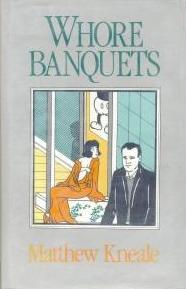Whore Banquets
How to escape from a nightmare
By Mark Schreiber
A version of this review appeared as
"Escape from a Nightmare" in
Mainichi Daily News, 21 September 1987
See Mr Foreigner for another review of this novel under its later title.
Matthew Kneale Some foreigners board their planes for home emitting wistful sighs, taking their leave of a Japan of wonderful experiences and happy memories. But not everyone is so fortunate; for the gaijin protagonist in this new novel by a 27-year-old Briton, to leave Japan is literally to escape from a nightmare, a frenzied dash for sanity just steps ahead of a hostile mob. English sensei Daniel Thayne is a modern-day Oliver Twist in a Japan where, the author makes it plain, to be an impoverished, lonely gaijin is to be unhappy in the extreme. Granted, it is no fun to be poor anywhere. But it is one thing to pursue adventure and romance on a humble pallet for one dollar a day in, say, Katmandu, and quite another not to be able to afford even the meanest lodgings in Tokyo's shitamachi for 10, or even 20 times that amount. Working touristsAs Japan gains in material wealth, young foreign transients, politely termed "working tourists," sink to increasingly lower rungs on the economic ladder. Thayne is somewhere near the bottom. His salary in arrears, every outlay for food, transportation or shelter evokes a sense of panic that his limited supply of yen is about to run out. Once it does: stranded far from home late one night after the last train has departed, and lacking taxi fare, he is forced to hitchhike back to his apartment. To make matters worse, he has lost his passport. With just about everything wrong than can possibly go wrong, he phones home to England in desperation, but the aggravating exchange with his father only serves to underscore the hopelessness of the situation. Caught in the squeeze between economic pressure and hostile, alien surroundings, Thayne is acutely aware of his vulnerability to forces he is only dimply able to comprehend. Every Japanese in the story represents some sort of subtle threat: Mrs. Chiba, devious owner of the English conversation school where he works, is a virtuoso at concocting ruses for delaying payment of his salary. A man Thayne suspects to be an immigration official comes around asking questions about whether or not he is working. His "girlfriend," Keiko, a divorcee in her 30s, dresses like a teeny bopper and adorns her apartment with Disney cartoon posters. Sullen and moody, she has little to offer him aside from a hand physical relationship. Keiko's father then makes a sudden appearance, hinting to Thayne that she is pregnant and commencing with marriage arrangements. At this point, the narrative shifts from bad dream to psychedelic nightmare. Sexual disasterAs far as Westerners in Japan are concerned, the '80s must surely stand out as the decade of the sexual disaster story. Kneale's book reads like public service messages cautioning against the spread of AIDS, a warning to foreigners against casual relationships with Japanese. Compare this with popular fiction in the '50s and '60s, when the questing Western male in Japan was ensured at least one memorable encounter, usually with nothing less than a genuine geisha! Kneale's impressions of Japanese tend to echo John David Morel's autobiographical work, Pictures from the Water Trade (1985), particularly regarding the ambivalence of sexual relationships. Both books, moreover, come to the conclusion that Japanese are so lacking in a sense of joie de vivre, their personal ties so constrained, and even their attempts at fun so formalized and structured, that the foreigners who allow themselves to be entangled in their midst must inevitably squirm from sheer discomfort. Unpleasant predicamentsOf the two works, however, Whore Banquets is less analytical and therefore less pretentious. Kneale's character is not an unemotional, detached observer of Japanese society; he is up to his neck in predicaments of the most unpleasant sort, and in danger of sinking even deeper. His employer, his girlfriend, her family, the obnoxious American and Australian with whom he forms chance acquaintances are all portrayed as meddling, deceitful or eager to exploit his honest, trusting nature. But the by-now tattered Thayne is allowed the opportunity to redeem himself, and the climax to the story represents the turning of the worm, so to speak, as he struggles to stand up to his various tormentors. Demanding the money owed to him, he tells everybody to get stuffed and then heads for Narita airport; he almost makes good his escape when the final disaster strikes. Desperate dashAs Thayne makes a desperate dash for safety and sanity a step ahead of his tormentors, the black humor is evident.
A story flavored with a generous helping of paranoia, Whore Banquets would appear to confirm my suspicions that current Western fiction has taken on an increasingly negative perception of Japan. Still, the negative premise doesn't detract from the author's skill as a storyteller. For those who have suffered through similar experiences, though, there's nothing funny about it. Indeed, Daniel Thayne's misfortunes are almost enough to evoke a primal scream of terror. |

